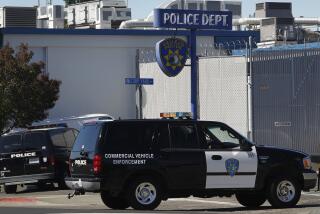Joyner Awarded $51,501 : Jurisprudence: 1984 gold medalist had asked for $4.5 million in damages for traffic stop.
- Share via
The jury in the damages trial of four Los Angeles police officers accused of inflicting serious emotional harm to Olympian Al Joyner during a traffic stop in 1992 awarded Joyner $51,501 in compensatory and punitive damages Wednesday, only a fraction of the $4.5 million he had sought.
The jury of five men and three women deliberated the entire day before returning to the courtroom in U.S. District Court. The jury appeared unimpressed with the sometimes emotional testimony of Joyner and his wife, Olympic sprinter Florence Griffith Joyner, who claimed that the incident had altered their family life and damaged Joyner’s reputation.
The jury’s verdict in the civil case called for $50,000 in compensatory damages and ordered Officer Armen Sevdalian and Detective Deborah Adams to pay punitive damages of $1,500 and $1, respectively.
Although the jury’s award appeared to be only a token, Joyner claimed victory.
“It’s like I ran a hurdle race but I didn’t get the world record,” he said. “I’m happy that I went all the way. I didn’t fold. I didn’t settle. I had my day in court.
“What hurt me the most, three (jury members) refused to shake my hand. They attacked my credibility. But my next day in court will be the Olympic Games.”
Joyner, 34, the gold medalist in the triple jump at the 1984 Olympics, said he is training for the decathlon for the 1996 Games in Atlanta.
Joyner was pulled over by police in Hollywood on May 8, 1992, after police incorrectly identified his license plate. They said they believed Joyner was driving a stolen car. Police ordered Joyner from the car at gunpoint, forced him to kneel and handcuffed him.
U.S. District Judge Terry J. Hatter Jr. ruled the stop to be unconstitutional in an earlier judgment.
After Joyner was released, he drove about two blocks and was pulled over again, by two officers who were present at the first stop. He was told his car matched the description of a car involved in a hit and run.
Hatter ruled the officers involved in the second stop had reasonable cause to pull Joyner over. Thus, the jury was not informed of the second stop and heard no testimony regarding it.
The weeklong trial, which ended late Tuesday afternoon, had been filled with the details of track and field training programs.
During deliberations on Wednesday, the jury asked Hatter whether any damages would be paid by the City or the officers themselves. Hatter instructed the jury that the officers would be liable.
The defense spent much time portraying Joyner--who with his wife has a seven-figure income--as an opportunist who has tried to benefit from the incident. That was offset with testimony from the officers regarding their bleak financial circumstances.
More to Read
Go beyond the scoreboard
Get the latest on L.A.'s teams in the daily Sports Report newsletter.
You may occasionally receive promotional content from the Los Angeles Times.








